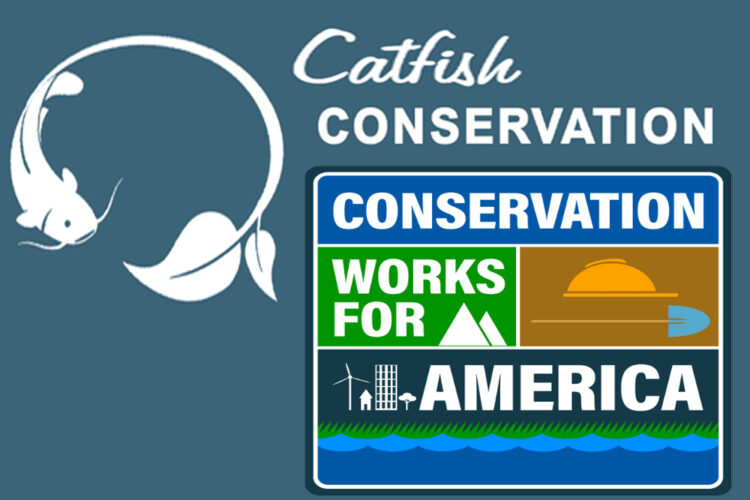“CONSERVATION WORKS” Program Promoted by NMMA and Others
When conservation efforts are successful it has a lasting public benefit for generations.
In late February, a coalition of ten organizations – including the National Marine Manufacturers Association (NMMA) – called on Congress to consider conservation priorities as policymakers draft economic recovery legislation.
NMMA joined the Theodore Roosevelt Conservation Partnership, National Audubon Society, Environmental Defense Fund, National Wildlife Federation, Ducks Unlimited, American Sportfishing Association, and others in identifying a list of shared legislative priorities with House and Senate leadership. The goals of the coalition include building resilient communities that can withstand the impacts of a changing climate, restoring and conserving outdoor spaces, investing in nature-based solutions, and sustainably managing water resources.
“The value of investing in our most common goods—our land and water—cannot be overstated,” wrote the coalition. “Beyond the clear ecological value, investment in the outdoors provides jobs, energizes local economies, improves the resilience of our communities, and holds a lasting public benefit for generations.”
 The groups highlighted eight main areas of focus:
The groups highlighted eight main areas of focus:
- Invest in our nation’s private lands.
- Improve the resilience of transportation infrastructure.
- Invest in the value of clean water.
- Support multi-benefit watershed management in the West.
- Support effective watershed management.
- Strengthen America’s coasts and restore iconic ecosystems.
- Invest in pre-disaster mitigation.
- Prioritize wetland restoration.
- Invest in Army Corps ecosystem restoration projects.
“As we look to rebuild our country and economy, investing in resilient outdoor recreation infrastructure and sound conservation programs will help achieve both objectives, while protecting our nation’s cherished pastimes for generations to come,” said Frank Hugelmeyer, President of the National Marine Manufacturers Association. “We call on all members of Congress to support and include these vital initiatives as they continue to develop their economic relief and infrastructure measures.”
“Following the economic downturn of the past year, we are calling for bold investments in conservation that put people back to work and strengthen the habitat, fish, and wildlife we value,” said Whit Fosburgh, president and CEO of the Theodore Roosevelt Conservation Partnership. “Hunters and anglers are joining this diverse coalition to ensure that Congress considers our land and water as part of the solution to the many challenges that we face. The policy proposals that we have put forward will create more resilient communities, combat climate change, and strengthen our outdoor industries.”
“The significant increase in fishing and other forms of outdoor recreation during the COVID-19 pandemic illustrates how much Americans deeply value the outdoors, and how important it is for our public lands and waters to be conserved and maintained,” said Glenn Hughes, president of the American Sportfishing Association. “We must invest in the outdoors not only for the physical and mental health benefits, but also to further expand the job opportunities in this booming sector of the economy that is responsible for 2.1% of the GDP.”
“From restoring the Colorado River watershed, to shoring up our beaches and wetlands on the coast, investing in conservation not only protects our communities from future droughts or floods, it also provides job opportunities as well as critical habitat for birds and other wildlife,” said Sarah Greenberger, senior vice president of conservation policy at National Audubon Society.
“Our coastal communities are at greater risk than ever from more intense storms and sea level rise,” said Steve Cochran, Associate Vice President, Coastal Resilience of the Environmental Defense Fund. “By investing in shovel-worthy programs, Congress can restore and enhance the coastal ecosystems that help protect communities, while also creating jobs and reducing the costs of future disasters.”
“Investing in 21st century infrastructure that benefits every community is a critical step toward addressing the historic crises facing our nation — the pandemic, mass unemployment, racial injustice, and climate change,” said Collin O’Mara, president and CEO of the National Wildlife Federation. “What better way to create millions of well-paying jobs than working together to rebuild our crumbling infrastructure, restore our lands and water, deploy cleaner sources of energy, bolster community and natural resilience, and reduce pollution, especially in frontline communities? We look forward to working with Congress to pass an infrastructure package that meets this moment by investing in our communities and our natural resources.”
“The challenges facing the 117th Congress are as numerous as they are immense,” said Ducks Unlimited CEO Adam Putnam. “But these challenges also provide a tremendous opportunity to invest in our land and water like never before. Following a difficult year, there’s no question smart investments in conservation can help get our economy back on its feet and our people back to work. At the same time, America’s renewed interest in the outdoors calls for a greater investment in the spaces that connect kids to nature, create memories for families, support millions of jobs and pump billions of dollars into the communities that surround our parks, refuges and magnificent wild places.”



